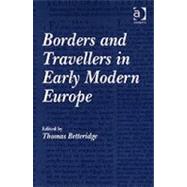Borders and Travellers in Early Modern Europe
, by Betteridge,Thomas- ISBN: 9780754653516 | 075465351X
- Cover: Hardcover
- Copyright: 3/24/2016
Early modern Europe was obsessed with borders and travel, concepts that appealed and appalled in equal measure. Adopting a broad cultural approach, this collection opens with an introduction placing its twin topics, borders and travellers, within a historiographical and theoretical context. It then presents a series of essays dealing with travel in the near east, Venice and Germany, as well travel writing and texts across Europe. Other chapters deal with specific border zones, such as the Irish Pale and the border between Christians and Turks, and ambiguous spaces including pirate ships, brothels and hospitals. Through a shared awareness of the way in which travelling and border crossing in the early modern world inevitably raised questions about identity, order and power, the contributors to this volume underline the shifting and uncertain nature of borders and travelling, and offer a fascinating insight into the cultural and social world of early modrn Europe. Early modern Europe was obsessed with borders and travel. It found, imagined and manufactured new borders for its travellers to cross. It celebrated and feared borders as places or states where meanings were charged and changed. In early modern Europe crossing a border could take many forms; sailing to the America, visiting a hospital or taking a trip through London's sewage system. Borders were places that people lived on, through and against. Some were temporary, like illness, while others claimed to be absolute, like that between the civilized world and the savage, but, as the chapters in this volume show, to cross any of them was an exciting, anxious and often a potentially dangerous act. Providing a trans-European interdisciplinary approach, the collection focuses on three particular aspects of travel and borders: change, status and function. To travel was to change, not only humans but texts, words, goods and money were all in motion at this time, having a profound influence on cultures, societies and individuals within Europe and beyond. Likewise, status was not a fixed commodity and the meaning and appearance of borders varied and could simultaneously be regarded as hostile or welcoming, restrictive or opportunistic, according to one's personal viewpoint. The volume also emphasizes the fact that borders always serve multiple functions, empowering and oppressing, protecting and threatening in equal measure. By using these three concepts as measures by which to explore a variety of subjects, Borders and Travellers in Early Modern Europe provides a fascinating new perspective from which to re-assess the way in which early modern Europeans vied themselves, their neighbours and the wider world with which they were increasingly interacting. Contents: Introduction: Borders, travel and writing, Tom Betteridge. Part I Borders: Highways, hospitals and boundary hazards, Margaret Healy; Alien desires: travellers and sexuality in early modern London, Duncan Salkeld; Rogue traders: national identity, empire and piracy 15801640, Claire Jowitt. Part II Europe: Life and death on the Habsburg-Ottoman frontier: Baacute;lint Balassi's 'In Laudem Confiniorum' and other soldier-songs, Mike Pincombe; Unwanted travellers: the tightening of city borders in early modern Germany, Maria R. Boes; Translation and the migration of texts, Andrew Pettegree. Part III Travellers: 'Idiote': politics and friendship in Thomas Coryate, David Baker; Returning from Venice to England: Sir Henry Wotton as diplomat, pedagogue, and Italian cultural connoisseur, Melanie Ord; Sacred cannibals and golden kings: travelling the Borders of the New World with Hans Staden and Walter Ralegh, Neil L. Whitehead. Afterword: Did cannibals have a Renaissance?, Andrew Hadfield; Index. About the Author: Dr Thomas Betteridge is from Oxford Brookes University, UK.







